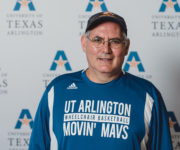Meet the Match
A Disability Advocate Dreams of Sports for All Guyanese
Leroy Phillips doesn’t remember life before blindness. What he does remember is the day the world discovered he was blind.
It was a sunny day in Georgetown, Guyana. A 6-year-old Leroy had walked home from school and met his grandmother on the front porch, where she handed him a Popsicle to cool down. The Popsicle slipped from his hands and fell to the ground. He couldn’t seem to find it. In that moment, his grandmother noticed something strange in his eyes. “Can you see me, Leroy?” she asked him. By that point, he didn’t know there was anything to see.
“It didn’t register in my mind that something about me was different,” Leroy says. “I couldn’t tell. I kept doing the things sighted kids would do.”
Leroy was transferred to a blind school where he learned braille. He was basically a “shut-in” for the next years with his large extended family protecting him from the world outside. By 2006, however, his friends at school had started telling him about this new sport, blind cricket, and how there were recruiters seeking blind players in Georgetown.
“I didn’t believe it existed; I thought they were being lied to,” Leroy recalls. “Then they told me that they were taking a team to Barbados to compete in a competition. I thought, ‘Who’s going to take a team of blind people out of this country to play a sport no one has heard of before?’”
But, Leroy was wrong. Mark Harper and Theresa Pemberton, founding members of the newly-established Guyana Blind Cricket Association, were recruiting a team. Leroy’s father drove him to practice. In just one training session it was evident that Leroy had a talent for the sport. A few days later, he was asked to join the team on its regional tour.
From that moment, opportunities sprang up for Leroy. Blind cricket was his ticket to traveling throughout the Caribbean to meet new people and be exposed to new ideas. While he felt as if he was pulled away from society after his blindness was discovered, sport became a way for Leroy to feel more accepted in Guyana.
“Sports for anybody with a disability may be the only opportunity where they get to feel they are part of society,” Leroy says. “It is even more critical for us because it provides us a golden opportunity to spread our wings and show people who think less of us what we’re capable of.”
In addition to playing on Guyana’s national blind cricket team, Leroy is a producer and presenter for the nationally-broadcast radio show “Reach Out and Touch” and a communications student at the University of Guyana. He also serves as program relations officer for the West Indies Cricket Council for the Blind and Visually Impaired. His leadership and disability advocacy earned him the Queens Young Leader Award from Elizabeth II in 2015.
Despite Leroy’s successes, life for people with disabilities in Guyana is not easy. The most recent government survey from the National Commission on Disability (NCD) was completed in 2002 and reported approximately 49,000 people, or 6 percent of the population at that time had a disability. He estimates the number is closer to 100,000.
The country has significant accessibility and job discrimination challenges. While a national law on disability was signed in 2010, Leroy believes there has been little enforcement.
“I can count on my right hand how many people with disabilities are employed in Guyana,” Leroy says. “Environments are not prepared to host someone with disability. If someone with a hearing impairment wants to apply for a journalism post or a major company like Digicel, they will be turned down for their disability and—even though we have a law—nothing will happen.”
There is also a lack of development in the adaptive sports sector. A few years ago, Leroy says other para sports were being developed, but outside of blind cricket and athletics there has been minimal progress.
Arriving to the U.S. Department of State Global Sports Mentoring Program, Leroy came in with the strong belief that the more people with disabilities become involved in sports, the more beautiful pictures are painted for the non-disabled community. For this reason, he was eager to gain every piece of information he could on adaptive sports and how to develop them in Guyana.
“I’m sure right now there are thousands of people with disabilities in my country who are locked in at home without anything to do,” Leroy says. “Whether it is wheelchair basketball, amputee racing or wheelchair tennis, people would welcome these opportunities with excitement.”
During the program, Leroy was mentored by Doug Garner, assistant director of campus recreation for adapted sports for the University of Texas-Arlington. At the university, Doug organizes teams in five adaptive sports, while coaching one of the most successful collegiate men’s wheelchair basketball teams in the United States. His vast experience in developing adaptive sports programs were essential for supporting Leroy in his ambitions to establish new sports in his country. As Leroy brought his own unique perspective and experience as a blind sports athlete and advocate to Texas, Doug partnered with him to create an impact that extends to generations of potential athletes in Guyana and beyond.

